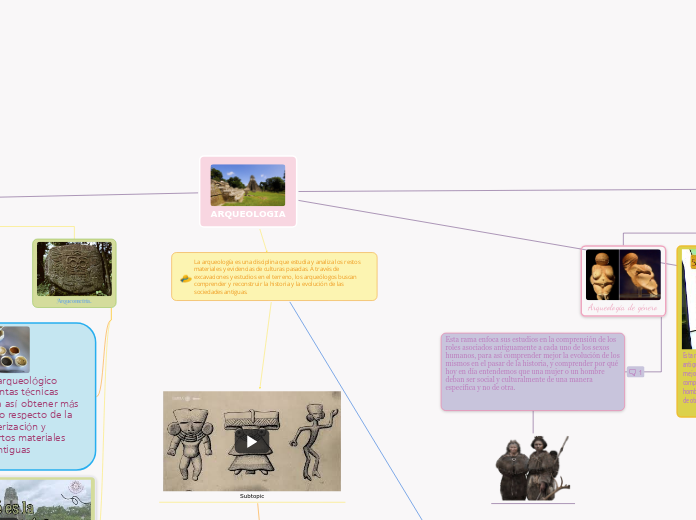av laura gomez för 2 årar sedan
279
ARQUEOLOGIA

av laura gomez för 2 årar sedan
279

Mer av detta
Name the character
Type in the name of the character whose change throughout the story you are going to analyze.
Example: Nick Carraway.
Character's behavior
Think of the character's behavior at the beginning of the story and look for the way it changed throughout the story.
La paleontología es la ciencia natural que estudia e interpreta el pasado de la vida sobre la Tierra a través de los fósiles. Se encuadra dentro de las ciencias naturales, posee un cuerpo de doctrina propio y comparte fundamentos y métodos con la geología y la biología con las que se integra estrechamente.
Initial behavior
How does the character act at the beginning of the story? Type in a relevant quote for your statement.
Example: Nick shows his immature side as he leaves to New York in order to avoid 'being rumored into marriage' with his girlfriend.
The reason for the change in behavior
What caused the character to change the first behavior you mentioned? Type in the reason for the change.
Example: 'because no one else was interested ', and he felt Gatsby shouldn't be left alone in his last moments.
La arqueología de género es un método de estudio de las sociedades del pasado que examina, por el sesgo de su cultura material, la construcción social de las identidades y de las relaciones humanas
Character's feelings
Focus on the way the character's feelings are presented at the beginning and at the end of the story, while explaining why they have changed.
The reason for the change of feelings
Why did the character change his feelings? Type in the answer.
Example: the East lost its appeal due to the shallowness, carelessness and corruption.
The reason for the change of feelings
What caused the character to change the first belief you mentioned? Type in the reason for the change.
Example: disgust towards the lack of morality in the Buchanan family.
Change of feelings
In what way did the character change the feeling you mentioned?
Type in a quote to support your statement.
Example: 'They are a rotten crowd. You're worth the whole damn bunch put together.' - Nick criticizing the Buchanans.
Initial feelings
How does the character feel about a certain subject at the beginning of the story? Type in a relevant quote to support your statement.
Example: "Reserving judgements is a matter of infinite hope."
Initial feelings
What was the character's initial belief? Type in a relevant quote.
Example: 'seems like the ragged edge of the universe' - Nick talking about Midwest, the place where he grew up.
Title
Type in the title and author of the literary work that introduces the character.
Example: The Great Gatsby, by F. Scott Fitzgerald.
Initial behavior
What is the character's behavior at the beginning of the story? Type in a relevant quote for your statement.
Example: Nick seems to be an honest person, calling himself 'one of the few honest people that I have ever known'.
Los arqueólogos estudian la historia del ser humano a través de los restos como huesos, tejidos, cerámica, herramientas, características del paisaje y de las construcciones. Entre sus funciones destacan la excavación, identificación, registro y conservación de restos históricos.
La arqueología es una disciplina que estudia y analiza los restos materiales y evidencias de culturas pasadas. A través de excavaciones y estudios en el terreno, los arqueólogos buscan comprender y reconstruir la historia y la evolución de las sociedades antiguas.
En resumen, la arqueología nos permite conocer y comprender nuestro pasado a través del estudio y análisis de los vestigios de civilizaciones antiguas. Es una disciplina fascinante que nos ayuda a reconstruir y apreciar la diversidad y complejidad de las sociedades que nos precedieron.
En la actualidad, la arqueología es considerada una ciencia histórica autónoma; es decir sería una de las distintas disciplinas históricas. Su principal objetivo es el estudio de los cambios en la organización social, así como la diversidad del comportamiento humano (económico, político, ideológico) en el pasado.
Además de desenterrar y analizar los restos arqueológicos, los arqueólogos también se dedican a la conservación y preservación del patrimonio cultural. Trabajan en estrecha colaboración con organismos gubernamentales y comunidades locales para proteger y gestionar adecuadamente los sitios y artefactos arqueológicos, garantizando así su legado para las generaciones futuras.
La conservación del Patrimonio no supone simplemente la permanencia de la materia de los bienes que lo integran, sino que debe conllevar ante todo la preservación de un conjunto de valores que son los que en último caso justifican su trascendencia, pues mientras que unos tienen soporte directo en su propia realidad .
El patrimonio cultural ayuda a definir el sentido de identidad de un pueblo, hace parte de su historia y puede ser una fuente de cohesión social y orgullo colectivo. Además, puede convertirse en un activo económico vital que impulse el desarrollo sostenible.
Asimismo, el director científico del proyecto afirma que estas actividades también anima a los investigadores a plantearse nuevas incógnitas. “Nosotros cuando comenzamos a excavar el foro de Los Bañales no nos imaginábamos cómo era la estructura arquitectónica en alzado -menciona Andreu-, fue cuando empezamos a hacer los vídeos que nos preguntamos qué altura tendría ese pórtico, por dónde entraría la iluminación, etcétera”.
Los arqueólogos estudian diversos tipos de sitios arqueológicos, como ciudades antiguas, tumbas, fortalezas y asentamientos rurales. A través del análisis de los artefactos encontrados, como cerámicas, herramientas, joyas y restos biológicos, los arqueólogos pueden reconstruir aspectos importantes de la vida de antiguas civilizaciones, como su economía, religión,